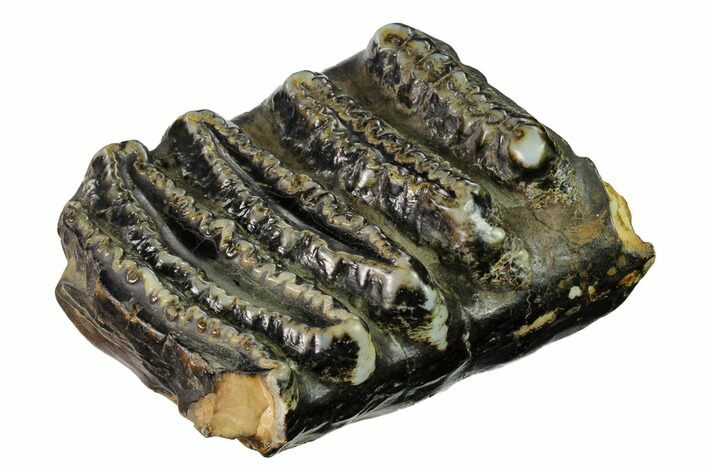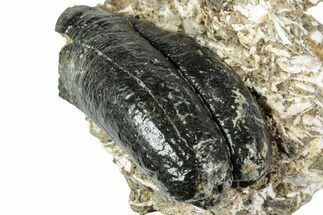This Specimen has been sold.
4.6" Partial Stegodon Molar - Indonesia
This is a 4.6" long, partial, fossil molar of a Stegodon. It was collected from Pleistocene aged deposits in Indonesia.
Stegodon is a genus of the extinct subfamily Stegodontinae of the order Proboscidea. In the past, stegodonts were believed to be the ancestors of the true elephants and mammoths, but now they are believed to have no modern descendants. Stegodonts were one of the largest proboscideans: some species reached over 12 feet tall and weighed over 12 tons.
Stegodonts were present from 11.6 million years ago to the late Pleistocene. There are unconfirmed records of regional survival until 4,100 years ago. Fossils are found in Asian and African strata dating from the late Miocene. They lived in large parts of Asia, east and central Africa, and North America during the Pliocene and Pleistocene epochs.
Similar to modern-day elephants, stegodonts were likely good swimmers, since their fossils are frequently encountered on Asian islands (Sulawesi, Flores, Timor, and Sumba in Indonesia; Luzon and Mindanao in the Philippines; Taiwan; and Japan). None of these locations were connected by land bridges with the Asian continent, even in periods of low sea-level during the cold phases of the Pleistocene.
Stegodonts were present from 11.6 million years ago to the late Pleistocene. There are unconfirmed records of regional survival until 4,100 years ago. Fossils are found in Asian and African strata dating from the late Miocene. They lived in large parts of Asia, east and central Africa, and North America during the Pliocene and Pleistocene epochs.
Similar to modern-day elephants, stegodonts were likely good swimmers, since their fossils are frequently encountered on Asian islands (Sulawesi, Flores, Timor, and Sumba in Indonesia; Luzon and Mindanao in the Philippines; Taiwan; and Japan). None of these locations were connected by land bridges with the Asian continent, even in periods of low sea-level during the cold phases of the Pleistocene.
SPECIES
Stegodon
AGE
LOCATION
Java, Indonesia
SIZE
4.6" long, 3.6" wide
CATEGORY
SUB CATEGORY
ITEM
#146291
We guarantee the authenticity of all of our specimens.
 Reviews
Reviews













